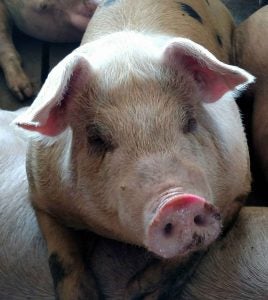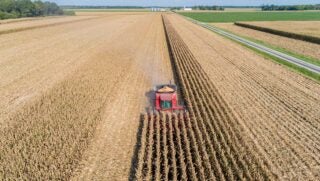Newsflash to anyone moving to the country: combines are noisy, pigs are smelly, tractors create dust, and cows are always mooing.
Hog farmers in North Carolina are wishing their neighbors got the memo before settling down next door. Smithfield Foods, the largest pork producer in the world, has been named in more than two dozen lawsuits by over 500 residents of North Carolina. The first trial ended in April with a jury verdict for the farm’s neighbors and a $50 million punitive damage award against Smithfield. The second jury verdict also came in against Smithfield with another $25 million in punitive damages.
What is the basis for the lawsuit? Put simply, the residents are mad that the farms stink.
The lawsuits claim that these hog farms breached the standard of care by not utilizing every available option to decrease the smell of the farms. The neighbors argued that Smithfield had additional technology that could have minimized the potency of the manure. Because the jury agreed, Smithfield has to compensate the neighbors for the breach, which amounted to $750,000 in the first lawsuit. The punitive damages were an additional penalty, meant to “punish” the company for its actions.

As an attorney myself, I can’t help but point out a particularly sly — albeit brilliant — move by the trial lawyers. Instead of suing the families who own the farms, they decided to sue Smithfield Foods. Smithfield owns the pigs, while the farmers take care of and raise them. The lawyers were savvy enough to realize that a jury might hesitate to enter a verdict against a local farm family. But a jury wouldn’t have the same reservations about hitting the largest pork producer in the world with not only compensatory damages, but also punitive damages.
The whole thing stinks. Pun intended.
The legislature of North Carolina passed a bill that would restrict these types of lawsuits against farms in the state. Although the governor vetoed the bill, the legislature has overridden his veto. The new law allows only people living within a half-mile of the farm to file a nuisance lawsuit, and prohibits punitive damages unless the farm was implicated in criminal convictions or government enforcement actions. In addition, the lawsuit must be brought within a year of a farming operation starting or undergoing a “fundamental” change, which does not include changes in ownership, technology, product, or size of the operation.
Michigan, where my family farms, has similar legislation. The Michigan Right to Farm Act protects farms from nuisance lawsuits as long as the farm is following Generally Accepted Agricultural and Management Practices (GAAMPs). The GAAMPs are developed and implemented by the state Department of Agriculture and Rural Development. So far, the law has been upheld in the courts and has saved countless farms from these ridiculous lawsuits.
Every single state should notice what is happening in North Carolina and act immediately to protect its farm families.
These types of lawsuits could easily bankrupt a farm even in the best economic circumstances. None of those farms in North Carolina were breaking the law. None of them were doing anything wrong or illegal. As Jim Heimerl, president of the National Pork Producers Council and a hog farmer in Ohio, pointed out, these farms have “operated responsibly and in compliance with state laws since 1985” maintaining “the highest standards of environmental and community stewardship.”
The trial lawyers decided to sue Smithfield Farms because it has deep pockets and makes this type of lawsuit very profitable. But look how easily the legal precedent was set. Without laws protecting farm families in every single state, we could see these types of lawsuits spread across the country and cripple our agriculture sector.
Amanda Zaluckyj blogs under the name The Farmer’s Daughter USA. Her goal is to promote farmers and tackle the misinformation swirling around the U.S. food industry.



